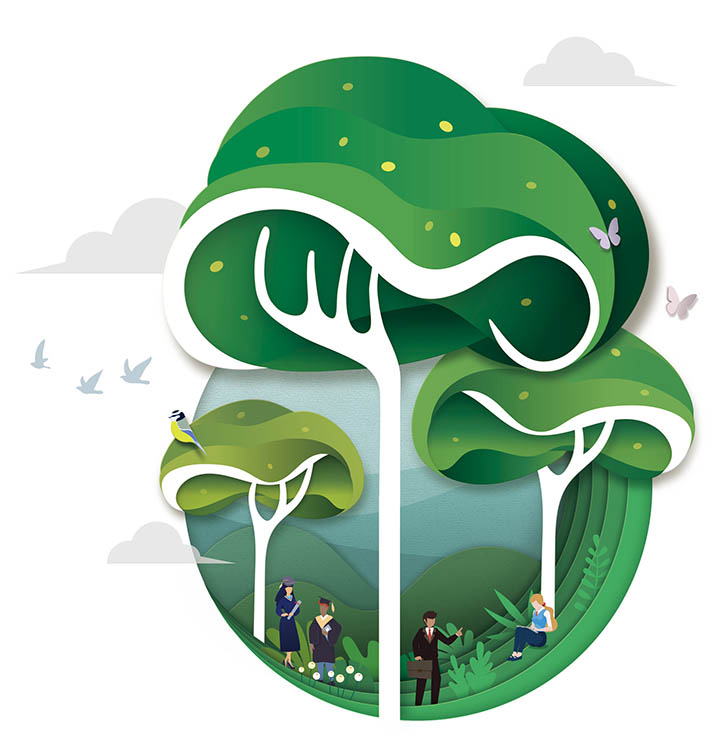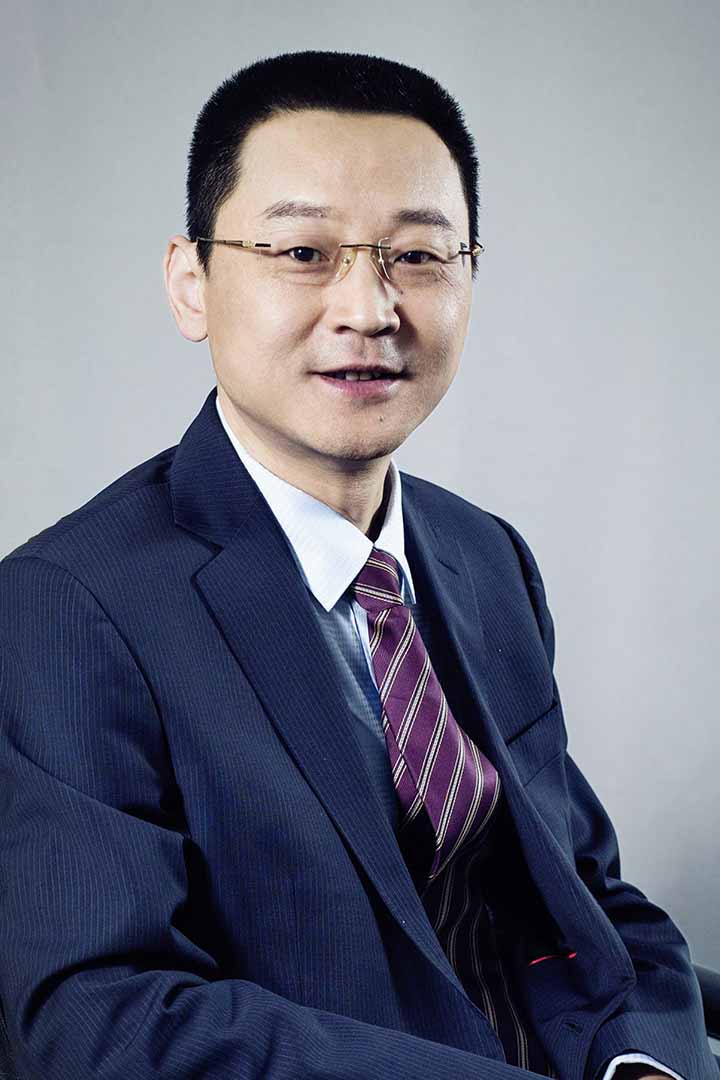Building a Vibrant Talent Ecosystem to Empower Industries
This site uses cookies. By continuing to browse the site you are agreeing to our use of cookies. Read our privacy policy>
![]()
Enterprise products, solutions & services

Reading guide: Talent has been the most important factor in production throughout history. In the digital world that we find ourselves in today, there's a need to bridge the gap between talent supply and demand, so Huawei has been building talent alliances, developing talent standards, improving skills, and promoting the value of talent. Ultimately, Huawei strives to build educational, industry and public talent ecosystems to improve the digital skills of societies, as well develop technologies and industries.
New Information and Communications Technology (ICT), such as 5G and cloud, Artificial Intelligence (AI), is helping to build a world in which everything is sensed, connected, and intelligent. In the past two years, intelligent and digital technologies have played a vital role in the fight against COVID-19. Globally, most governments agree that digitalization is essential, with more than 170 countries worldwide implementing national digital strategies.
According to research by the renowned management consulting firm McKinsey & Company, the COVID-19 pandemic has accelerated the digitalization process by seven years around the world and 10 years in the Asia-Pacific Region. With industries around the world going digital, ICT has become a key driver in executing national strategies. ICT can drive the rapid development of the digital economy, which is growing at a rate 2.5 times that of national Gross Domestic Product (GDP).
As they apply more digital technologies, the biggest challenge industries face as they develop is a lack of ICT talent. The application of emerging technologies is reshaping the industry value chain and the competitive landscape. Accelerating digital transformation is the only way for enterprises to survive, and to thrive, while digital talent is the key to digital transformation. Meanwhile, there is a structural gap between ICT talent supply and industry demand. The problem is especially prominent in emerging domains such as Huawei's Kunpeng, HarmonyOS, and Euler ecosystems, which urgently need millions of ICT professionals.
In addition, talent training needs to keep pace with fast-developing digital technologies, which means it's necessary to constantly update teaching materials, courses, and experimental conditions. Traditional college education isn't sufficient to fill the talent gap in industry verticals that are going through accelerating digital transformation.
Based on the technologies, knowledge, experience, and best practices it has accumulated in the ICT industry, Huawei has been building talent alliances, developing talent standards, improving skills, and promoting the value of talent. We strive to build educational, industry, and public talent ecosystems in order to improve the digital skills across society, as well as develop technologies and industries (see Figure 1).

Figure 1: Huawei's talent alliance
To quickly develop ICT talent for new domains, alliances, and ecosystems should be established. Huawei shares technologies and experience and exchanges capabilities with our partners and customers. We collaborate with universities, international education organizations, governments, industry associations, as well as our partners and customers, working together to build an enablement platform for sustainable talent development.
Colleges and universities are the source of talent development and supply. The cooperation between universities and enterprises ensures the continuous inflow of advanced technologies and industrial practices into universities. In 2013, Huawei launched the Huawei ICT Academy project — a university-enterprise collaboration program. The project shares the latest technologies, course systems, and engineering practices to help universities build a stronger faculty. It aims to share knowledge on cutting-edge technologies in colleges and universities around the world and help them develop ICT talent by creating online learning and experiment platforms, carrying out innovation training camps, and holding teacher workshops. To date, Huawei has set up Huawei ICT Academies in more than 1800 colleges and universities around the world, while a total of 150,000 college students have passed Huawei certifications.
In response to UNESCO's call to suspend classes without stopping learning, Huawei formulated its 'Learn ON' action plan to ensure the continuity and quality of learning during the pandemic. Huawei also participated in a coordinated industry-university talent development program launched by China's Ministry of Education. By November 2021, Huawei had invested in 480 projects related to the program.
Huawei also works with ministries of labor and human resource departments in various countries, providing ICT training for their citizens and promoting local employment. Huawei was one of the first group of social training and assessment organizations that was registered at the Shenzhen Human Resources Bureau. Candidates who pass Huawei certification exams can receive corresponding Huawei certificates as well as vocational skill certificates, and can get subsidies to improve their vocational skills. Outside China, Huawei certifications have become nationally recognized enterprise certifications in Colombia, and Huawei expects to help Colombia to train 50,000 ICT professionals and experts in the next three years.
Huawei has also engaged in joint ICT talent development programs with governments around the world. For example, in 2019, Huawei and the Egyptian government launched a flagship talent capability development program — the ICT Talent Bank (ITB), to provide technical training for Egyptian students. Huawei also held talent selection conferences to promote ICT talent employment and support digital transformation in related industries. By May 2021, Huawei had set up 69 ICT academies worldwide, training 400 teachers and more than 10,000 students, among whom 4000 had passed Huawei certifications.
To support lifelong learning, Huawei works with its Authorized Learning Partners (HALPs) to provide training and certification services to the public, with the aim of training more people to become ICT professionals. By September 2021, Huawei had 110 HALPs worldwide.
Based on the collaborative 'cloud-pipe-device' ICT architecture, Huawei has launched leading ICT talent development systems and certification standards — Huawei Career Certification and Huawei Professional Certification. Huawei Career Certification helps to improve trainees' skills and increase their job opportunities (see Figure 2). Huawei Professional Certification is designed to improve the technical strengths, sales skills, and project management capabilities of partners based on their job positions.
Across the globe, Huawei certification is gaining recognition year by year, with the total number of Huawei certified individuals exceeding 540,000 by September 2021.

Figure 2: Huawei's certification architecture
Huawei has incorporated certification training for on-the-job engineers into the courses of colleges and universities, building a talent development model that can be implemented in those education institutions. This model aims to bridge the gap between vocational education and enterprise development as well as the gap between curriculums and the knowledge and skills that enterprises need, so that enterprises can easily recruit high-quality graduates who are ready to solve real-world problems. This model also allows enterprises to slash the time spent on and the costs of new employee training.
Shenzhen Polytechnic, founded in 1993, is one of China's flagship vocational colleges, having been among the first of these institutions to open in the country. It has partnered with Huawei for over a decade. After establishing a Huawei ICT Academy, the two parties have explored a new model of college-enterprise collaboration that complements each other's strengths for coordinated development, which improves industry-education integration. One of the outcomes of this partnership is the program of the Development and Practice of Integrating Certificate Acquisition in College Courses for ICT Talent, which won the National Teaching Achievement Special Award in 2018.
Huawei also cooperates with educational authorities to participate in the reform of teaching systems. In China, Huawei participated in the pilot project of '1 + X' certificates for vocational education, which encourages students to gain multiple vocational certificates while pursuing an academic qualification. Four Huawei certification systems, including network system construction and Operations and Maintenance (O&M), and intelligent computing platform application development, were approved to be part of this pilot project. The '1 + X' textbook, jointly compiled by Huawei experts and university teachers, has been included in the list of national textbooks for vocational education during the 13th Five-Year Plan Period by China's Ministry of Education. Since its release just over a year ago, more than 100,000 copies of the textbook have been issued.
Talent is fundamental to enterprise development, so Huawei has been collaborating with enterprises to develop digital talent, to help them go digital and intelligent, and to succeed in the digital world.
Huawei has accumulated vast experience during its own digital transformation and incorporated that experience into its talent development solution. Huawei's talent development solution focuses on technical enablement, business enablement, and management enablement (see Figure 3). Technical enablement is focused on network operations, O&M, and emerging technologies to develop ICT talent. Business enablement is focused on applying ICT in industries and developing 'π-type' business talent — those who are familiar with both ICT and industry knowledge. Management enablement is for mid- and high-level business managers, providing guidance on how to tackle the challenges of digital transformation from the perspectives of business insight, strategic execution, and organizational collaboration.
Huawei has also made significant achievements in developing ICT talent for industry verticals. In the financial service industry, Huawei assisted the Credit Card Center of China CITIC Bank in enabling its key staff. The enablement helped the bank staff build a closed-loop mindset that consists of setting goals, identifying knowledge and skills gaps, devising key measures, and ensuring effective execution through practical exercise, assisting the bank in executing digital transformation strategies. Huawei has also worked with the Longgang District Government of Shenzhen, Wuhan Metro Group, FAW-Volkswagen, and Everbright Bank, helping them improve the digital skills and digital management capabilities of their employees. In the first three quarters of 2021, Huawei provided digital talent development services to many industry customers, training 140,000 employees.

Figure 3: Huawei's digital talent development services
A good environment is crucial for talent growth, so Huawei strives to promote the value of talent and create a favorable atmosphere for talent growth by releasing talent white papers, as well as holding events such as Huawei ICT Competitions, talent selection conferences, Huawei Certified ICT Expert (HCIE) Nights, and summits.
To help countries formulate talent development policies and enterprises assess their talent needs, Huawei regularly releases white papers on talent to provide insight into ICT developments, analyze talent needs, offer talent development paths, and share best practices for talent development. With its partners, Huawei has released talent ecosystem white papers in China and Morocco, and will also release white papers in Kenya, South Africa, and Spain, as well as in several other European countries.
Huawei ICT Competitions aim to provide an international platform for college teachers and students, helping them increase their ICT knowledge, improve their practical skills and innovation capabilities, and showcase their talent and creativity. Since the first one in 2015, each edition of the Huawei ICT Competition has attracted more and more participants from around the world. In fact, in 2020 alone, more than 150,000 students from 2000 colleges and universities in 82 countries and regions signed up for the competition.
Huawei prioritizes talent ecosystem building and enables talent development for various industries, holding multiple online and offline talent selection conferences to build a bridge between talent supply and demand by bringing together students from Huawei ICT Academies, ecosystem partners, and industries. Moving forward, Huawei will work with ecosystem partners to build an open, sustainable, and mutually beneficial ICT talent ecosystem, with a target of training more than 1 million ICT professionals and experts by 2024. These efforts will help us to achieve our aim of improving the digital skills throughout societies and support sustainable social and economic development.

Pull quote:
We strive to build educational, industry, and public talent ecosystems in order to improve the digital skills across society, as well as develop technologies and industries.
— Ma Yue, CEO of Huawei's Smart Road BU